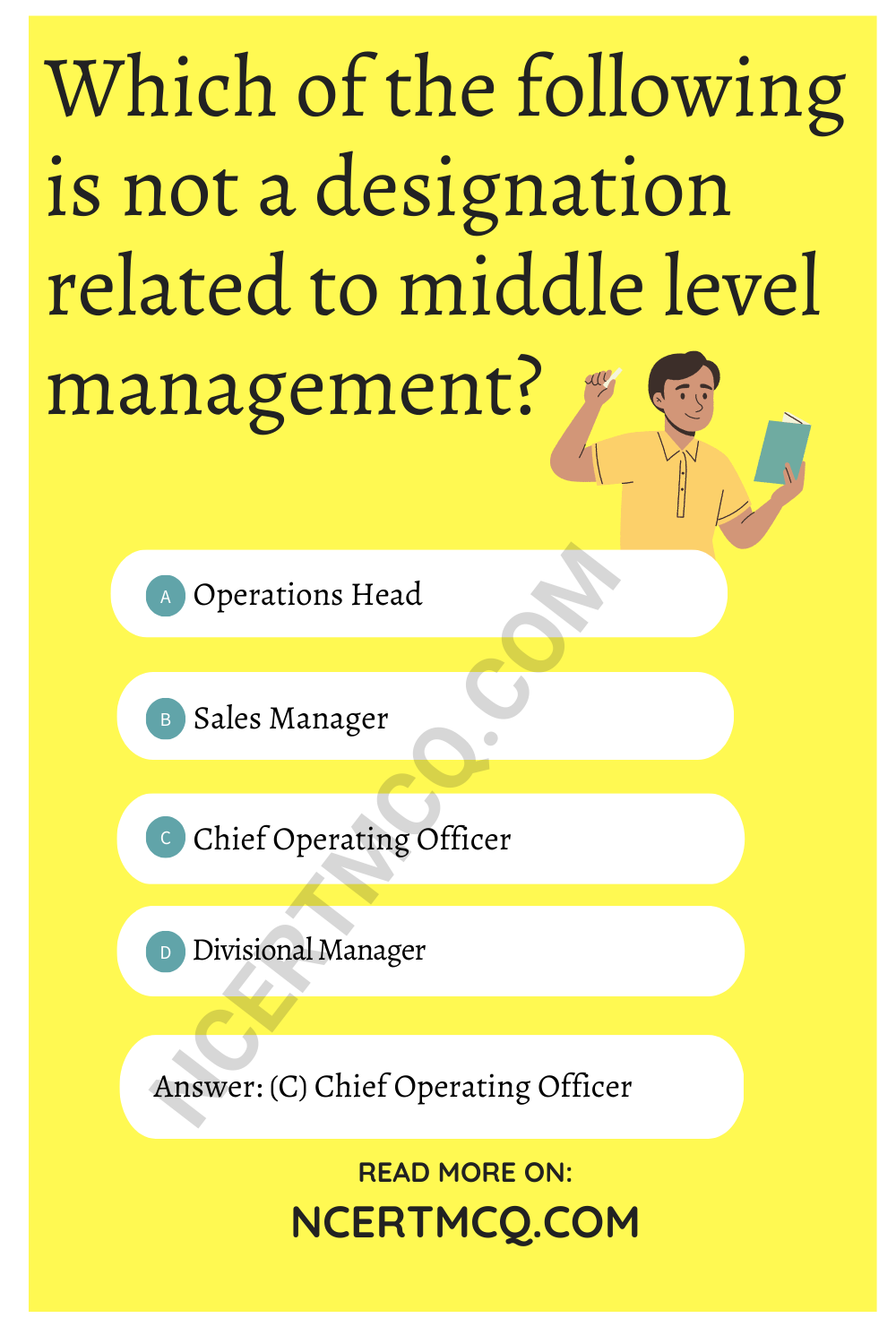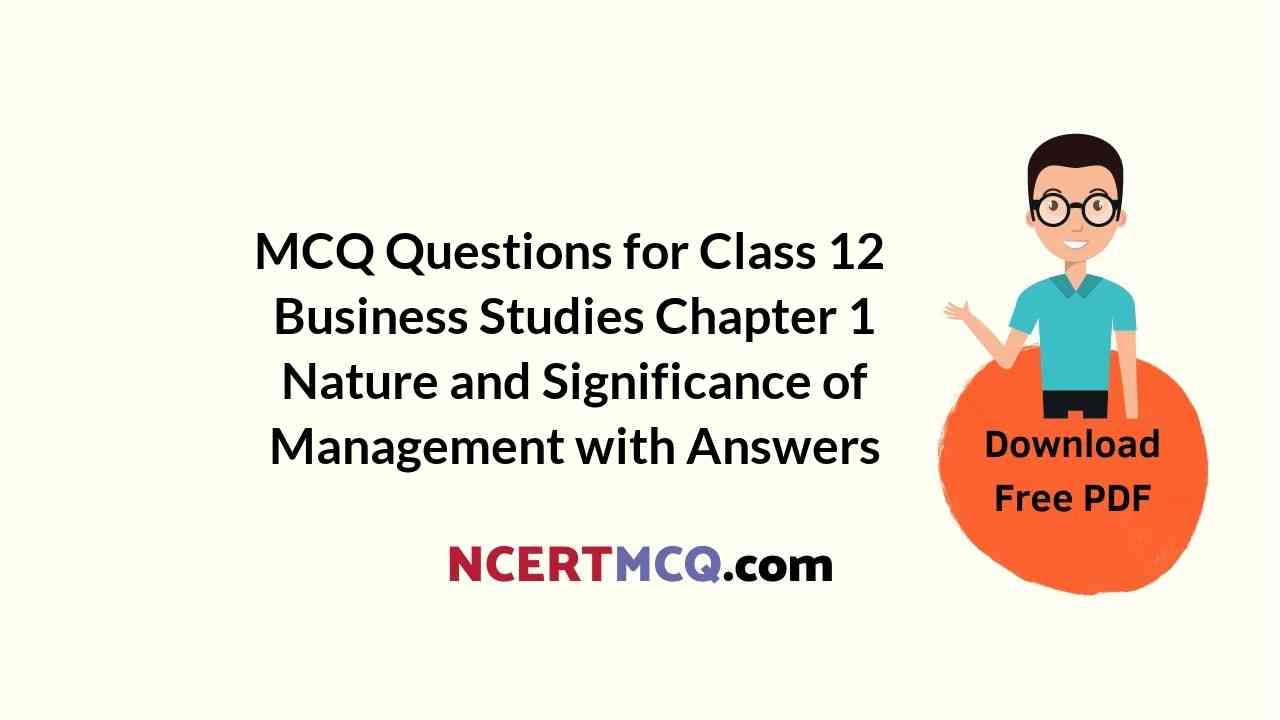Check the below NCERT MCQ Questions for Class 12 Business Studies Chapter 1 Nature and Significance of Management with Answers Pdf free download. MCQ Questions for Class 12 Business Studies with Answers were prepared based on the latest exam pattern. We have provided Nature and Significance of Management Class 12 Business Studies MCQs Questions with Answers to help students understand the concept very well.
Class 12 Business Studies Chapter 1 Nature and Significance of Management MCQ With Answers
Business Studies Class 12 Chapter 1 MCQs On Nature and Significance of Management
Nature And Significance Of Management MCQ Question 1.
Which one of the following statements is not correct?
(a) Management is a goal-oriented process.
(b) Management is a continuous process.
(c) Management is a dynamic process.
(d) Management is a rigid process.
Answer
Answer: (d) Management is a rigid process.
Nature And Significance Of Management Class 12 MCQ Question 2.
Which one of the following is not an importance of management?
(a) Integrating various interest groups
(b)Developing society
(c) Disciplining employees
(d) Inculcating creativity
Answer
Answer: (c) Disciplining employees

MCQ Of Nature And Significance Of Management Question 3.
Management is not
(a) an applied science.
(b) a pure science.
(c) an art.
(d) an art and science both.
Answer
Answer: (b)a pure science.
MCQ On Nature And Significance Of Management Question 4.
In which category does management fall?
(a) Well-established profession
(b) Semi-profession
(c) Emerging profession
(d) Marginal profession
Answer
Answer: (c) Emerging profession
Nature And Significance Of Management MCQ Pdf Question 5.
Top management is concerned with formulation of
(a) guidelines for supervisors.
(b) long-term plans.
(c) short-term plans.
(d) None of these.
Answer
Answer: (b) long-term plans.
Chapter 1 Business Studies Class 12 MCQ Question 6.
Coordination is
(a) a management function.
(b) the essence of management.
(c) an objective of management.
(d) a social objective.
Answer
Answer: (b) the essence of management.
Management Is Not A MCQ Question 7.
The element that aims at integrating group efforts to achieve group objectives is called ___
(a) Cooperation
(b) Coordination
(c) Management
(d) Directing
Answer
Answer: (b) Coordination
Question 8.
Managing Director is the position of ___ level of management in a large company.
(a) Top
(b) Middle
(c) Lower
(d) Middle and Lower
Answer
Answer: (a) Top
Question 9.
Management is multidimensional because it has ___ dimension(s).
(a) One
(b) Two
(c) Three
(d) Four
Answer
Answer: (c) Three
Question 10.
Management is a ___ directed process as it aims at achieving specified goals.
(a) Continuously
(b) Future
(c) Goal
(d) Deliberately
Answer
Answer: (c) Goal
Question 11.
___ is a systematised body of knowledge that explains certain general truths or operation of general laws.
(a) Science
(b) Art
(c) Profession
(d) Art and Profession both
Answer
Answer: (a) Science
Question 12.
Identify the feature of co-ordination being highlighted in the given statement: “Coordination is not a one time function, it begins at the planning stage and continue till controlling.”
(a) Coordination ensures unity of action
(b) Coordination is an all pervasive function
(c) Coordination is a continuous process
(d) Coordination is a deliberate function
Answer
Answer: (c) Coordination is a continuous process
Question 13.
Co-ordination is considered to be the essence of management because
(a) It is a common thread that runs through all the activities within the organisation
(b) It is implicit and inherent in all functions of the organisation
(c) It is a force that binds all the functions of management
(d) All of the above
Answer
Answer: (d) All of the above
Question 14.
This function of Management related to placing the right person at the right job is
(a) Organising
(b) Staffing
(c) Planning
(d) Controlling
Answer
Answer: (b) Staffing
Question 15.
This function of management relating to laying down the foundation for carrying out the other functions of management successfully is
(a) Organising
(b) Staffing
(c) Planning
(d) Controlling
Answer
Answer: (c) Planning
Question 16.
Organising as a function of management involves deciding
(a) What activities and resources are required
(b) Who will do a particular task
(c) Where will it be done
(d) All of the above
Answer
Answer: (d) All of the above
Question 17.
The main task of this level of management is to determine the overall organisational objectives and strategies for their realisation.
(a) Operational management
(b) Middle level management
(c) First line managers
(d) Top level management
Answer
Answer: (d) Top level management
Question 18.
Which of the following statements is not true for lower level management?
(a) Analyse the business environment and its implications for the survival of the business.
(b) Ensure the quality of the output
(c) They strive to reduce the wastage of resources
(d) They ensure that the safety standards are maintained within the organisation.
Answer
Answer: (a) Analyse the business environment and its implications for the survival of the business.
Explanation:
Analyse the business environment and its implications for the survival of the business-top level management
Question 19.
Which of the following is a function of top level management?
(a) Ensuring quality of output
(b) Assigning necessary duties and responsibilities to their departments
(c) Taking responsibility for all the activities of the business and its impact on the society
(d) Ensuring that the safety standards are maintained within the organisation.
Answer
Answer: (d) Ensuring that the safety standards are maintained within the organisation.
Explanation:
Ensuring quality of output; Ensuring the safety standards are maintained within the organisation – lower level management and assigning necessary duties and responsibilities to their departments – middle level management.
Question 20.
Which of the following is not a designation related to middle level management?
(a) Operations Head
(b) Sales Manager
(c) Chief Operating Officer
(d) Divisional Manager
Answer
Answer: (c) Chief Operating Officer
Explanation:
Chief Operating Officer is a designation for top level management.

True or False
State with reasons whether the following statements are True or False.
1. “Management principles can be applied to all types of activities.”
Answer
Answer: True; management is pervasive.
2. “Coordination is required at all levels of management in all management functions.”
Answer
Answer: True; coordination is pervasive.
3. “Management involves the decisions by a manager and it is not a group activity.”
Answer
Answer: False; management is a group activity because it unites individual efforts in common direction.
4. Top management level is responsible for implementing plans and strategies of the organisation.
Answer
Answer: False; it is the responsibility of the middle management level.
We hope the given NCERT MCQ Questions for Class 12 Business Studies Chapter 1 Nature and Significance of Management with Answers Pdf free download will help you. If you have any queries regarding Nature and Significance of Management CBSE Class 12 Business Studies MCQs Multiple Choice Questions with Answers, drop a comment below and we will get back to you soon.
Class 12 Business Studies MCQ:
- Nature and Significance of Management Class 12 MCQ
- Principles of Management Class 12 MCQ
- Business Environment Class 12 MCQ
- Planning Class 12 MCQ
- Organising Class 12 MCQ
- Staffing Class 12 MCQ
- Directing Class 12 MCQ
- Controlling Class 12 MCQ
- Financial Management Class 12 MCQ
- Financial Markets Class 12 MCQ
- Marketing Management Class 12 MCQ
- Consumer Protection Class 12 MCQ
- Entrepreneurship Development Class 12 MCQ
